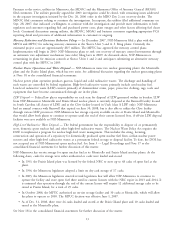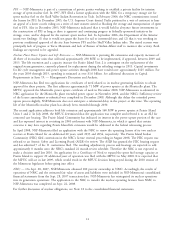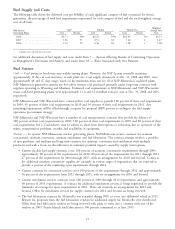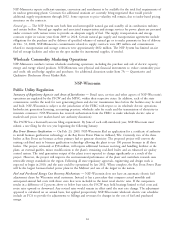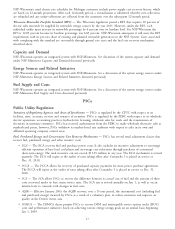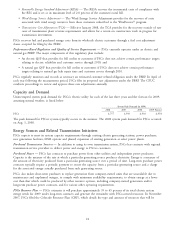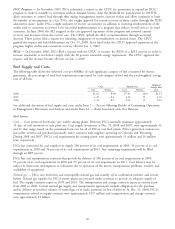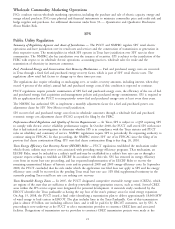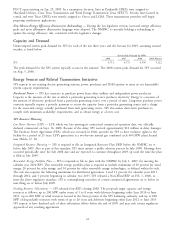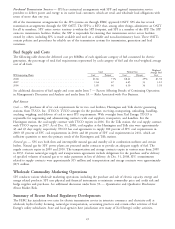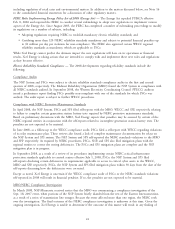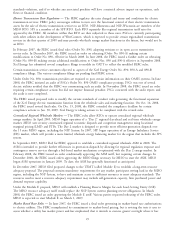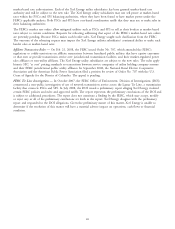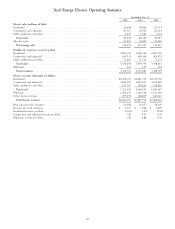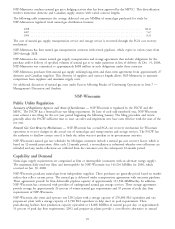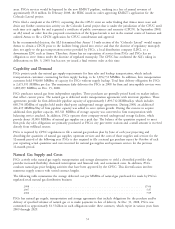Xcel Energy 2008 Annual Report Download - page 31
Download and view the complete annual report
Please find page 31 of the 2008 Xcel Energy annual report below. You can navigate through the pages in the report by either clicking on the pages listed below, or by using the keyword search tool below to find specific information within the annual report.Wholesale Commodity Marketing Operations
PSCo conducts various wholesale marketing operations, including the purchase and sale of electric capacity, energy and
energy related products. PSCo uses physical and financial instruments to minimize commodity price and credit risk and
hedge supplies and purchases. See additional discussion under Item 7A — Quantitative and Qualitative Disclosures
About Market Risk.
SPS
Public Utility Regulation
Summary of Regulatory Agencies and Areas of Jurisdiction — The PUCT and NMPRC regulate SPS’ retail electric
operations and have jurisdiction over its retail rates and services and the construction of transmission or generation in
their respective states. The municipalities in which SPS operates in Texas have jurisdiction over SPS’ rates in those
communities. The NMPRC also has jurisdiction over the issuance of securities. SPS is subject to the jurisdiction of the
FERC with respect to its wholesale electric operations, accounting practices, wholesale sales for resale and the
transmission of electricity in interstate commerce.
Fuel, Purchased Energy and Conservation Cost Recovery Mechanisms — Fuel and purchased energy costs are recovered
in Texas through a fixed fuel and purchased energy recovery factor, which is part of SPS’ retail electric rates. The
regulations allow retail fuel factors to change up to three times per year.
The regulations also require refunding or surcharging over- or under- recovery amounts, including interest, when they
exceed 4 percent of the utility’s annual fuel and purchased energy costs, if this condition is expected to continue.
PUCT regulations require periodic examination of SPS fuel and purchased energy costs, the efficiency of the use of fuel
and purchased energy, fuel acquisition and management policies and purchased energy commitments. SPS is required to
file an application for the PUCT to retrospectively review fuel and purchased energy costs at least every three years.
The NMPRC has authorized SPS to implement a monthly adjustment factor for a fuel and purchased power cost
adjustment clause for SPS’ New Mexico retail jurisdiction.
SPS recovers fuel and purchased energy costs from its wholesale customers through a wholesale fuel and purchased
economic energy cost adjustment clause (FCAC) accepted for filing by the FERC.
Performance-Based Regulation and Quality of Service Requirements — In Texas, SPS is subject to a QSP requiring SPS
to comply with electric service reliability performance targets. In October 2008, the PUCT staff served SPS with notice
that it had initiated an investigation to determine whether SPS is in compliance with the Texas statutes and PUCT
rules on reliability and continuity of service. NMPRC regulations require SPS to periodically file requesting authority to
continue using its FPPCAC. In that proceeding, the NMPRC reviews SPS’ use of its FPPCAC since the filing of its
previous fuel clause continuation filing. SPS’ next fuel clause continuation filing is due Aug. 26, 2010.
Texas Energy Efficiency Cost Recovery Factor (EECRF) Rider — PUCT regulations established the mechanism under
which electric utilities may recover costs associated with providing energy efficiency programs. That mechanism, an
EECRF Rider, must be included in a utility’s tariff and may be established in a utility’s base rate case or through a
separate request seeking to establish an EECRF. In accordance with this rule, SPS has removed its energy efficiency
costs from its recent base rate proceeding, and has requested implementation of its EECRF Rider to recover the
remaining unamortized balance of historic costs and its projected 2008 and 2009 energy efficiency costs. In September
2008, the PUCT concluded that the rule under which the application was filed does not apply to SPS and the energy
efficiency costs could be recovered in the pending Texas retail base rate case. SPS filed supplemental testimony in the
currently pending Texas retail base rate case seeking cost recovery.
Texas Renewable Energy Zones — In 2007, the PUCT designated competitive renewable energy zones (CREZs), which
are regions of the state that are sufficient to develop renewable energy generation sources, such as wind. Several CREZ
areas within the SPS service region were designated for potential development. A statewide study conducted by the
ERCOT identifies the Texas panhandle as having the top four of the state’s primary areas for wind energy expansion.
On Aug. 15, 2008, the PUCT issued a final order identifying a transmission plan to deliver approximately 18,000 MW
of wind energy to load centers in ERCOT. The plan includes lines in the Texas Panhandle. Cost of this transmission
plan is almost $5 billion, not including collector lines, and it will be paid for by ERCOT customers, not by SPS. A
proceeding is now underway at the PUCT to select transmission providers to construct CREZ lines and associated
facilities. Designations of transmission service providers to construct CREZ transmission projects were made at the
21




